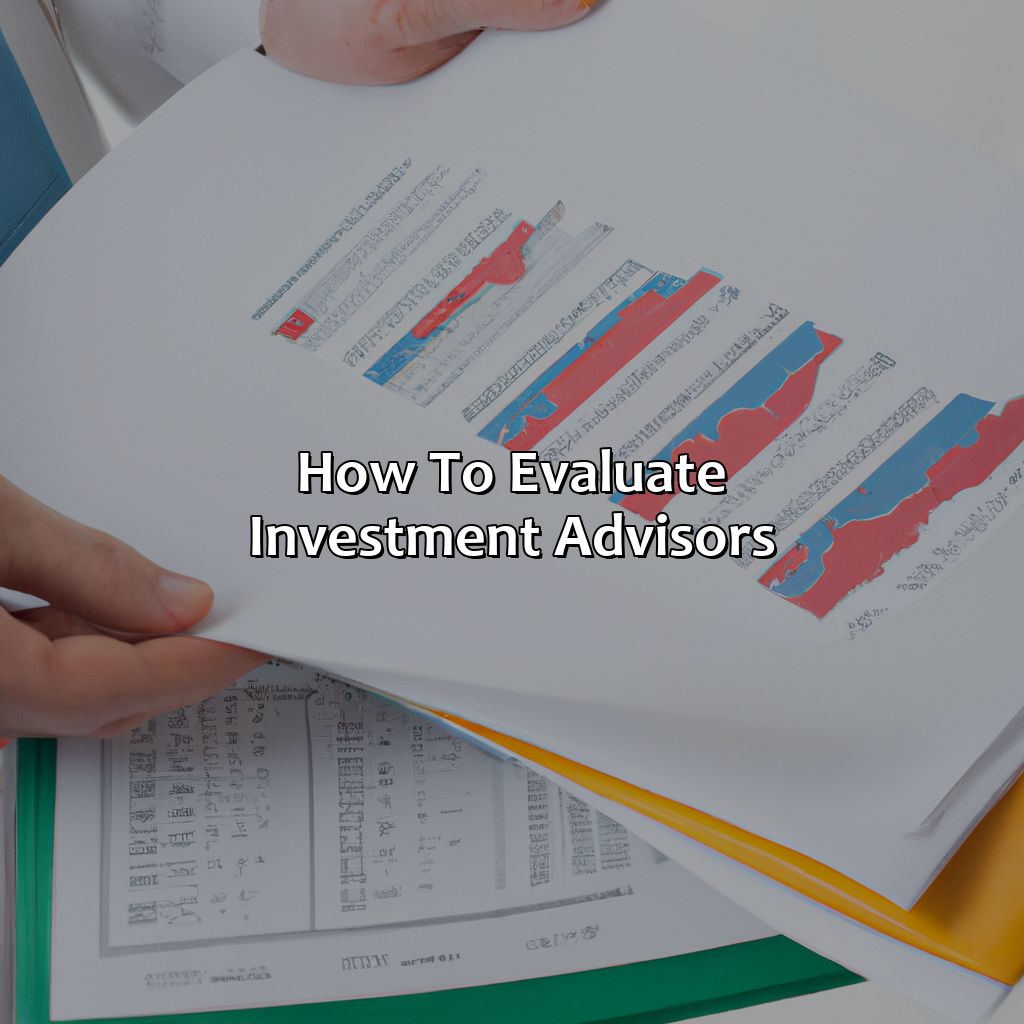How To Select An Investment Advisor?
Key Takeaway:
- Selecting the right investment advisor is crucial for the success of your portfolio. A good advisor can help you make informed decisions and achieve your financial goals.
- Important factors to consider when selecting an investment advisor include their qualifications and certifications, experience and track record, investment philosophy and strategies, communication and accessibility, and fees and charges.
- Evaluating investment advisors requires thorough research and background checks, interviews and meetings with potential advisors, and consulting client references and testimonials to assess their performance and reliability.
You want to get the most out of your investments, but how do you choose the right advisor? With the market constantly fluctuating, finding an experienced advisor you can trust is crucial. You need to make sure you select an investment advisor who understands your goals and can help you meet them.
Importance of selecting the right Investment Advisor
Many investors look for the right investment advisor to make sound investment decisions. Choosing a competent and trustworthy investment advisor is paramount, as it affects your financial future. Ensuring the selection of the right investment advisor involves determining their qualifications, experience, and investment strategy that matches your financial goals.
The importance of selecting an investment advisor who aligns with your investment objectives is significant. A professional advisor can provide personalized investment advice and strategic guidance to help achieve your financial goals. An investment advisor should also keep you informed about the investment risks and returns based on your investment portfolio.
Apart from the basic requirements, the right investment advisor has a unique set of skills, experience, and expertise. In addition, communication skills and the ability to explain investment concepts are essential. The right investment advisor listens to your goals and creates an investment plan tailored to your needs, which reflects your portfolio’s risk tolerance.
In 2015, a report by the Securities and Exchange Commission revealed that around 83% of investment advisors were either registered or affiliated with broker-dealers or investment advisory firms. It highlighted the importance of receiving investment advice from a qualified professional with the appropriate credentials and experience who can act in the client’s best interest.

Image credits: retiregenz.com by David Duncun
Factors to consider when selecting an Investment Advisor
Selecting a reliable investment advisor? Consider five key points!
- Qualifications & certifications
- Experience
- Strategies
- Communication & accessibility
- Fees & charges
These will help you weigh up the options and decide which advisor best aligns with your investment goals.

Image credits: retiregenz.com by Yuval Arnold
Qualifications and Certifications
Advisors’ Education and Credentials
To select the right investment advisor, analyzing their education and credentials can yield valuable insights. The degrees, certifications, and licenses earned by potential advisors indicate their competence in asset management. Look beyond their formalized education; explore if they have subscribed to ethical frameworks or industry standards like fiduciary requirements. Investing is highly dynamic, so choose a candidate who actively partakes in CPD programs.
Another aspect of this evaluation process involves exploring niche qualifications like CFP or CFA accreditations that represent specific areas of competency. Sound knowledge of specialized investment opportunities such as real estate funds and hedge funds will assist with better decision-making.
If an advisor has studied accounting or law, it may be an added advantage since they possess a broader understanding of finance’s legislative influences.
It would help if you also asked your candidates questions that pertain to their industry knowledge and previous professional experiences. These points will give you an informed backdrop into how the candidates operate while creating relationships with clients.
If you’re looking for an investment advisor with a great track record, just remember: past performance is no guarantee of future success.
Experience and Track Record
When selecting an investment advisor, it is important to consider their professional experience and past performance. Look for an advisor with a proven track record of success in managing investments for clients. This will give you confidence that they have the knowledge and skills necessary to make sound financial decisions on your behalf.
Additionally, research the types of clients the advisor has worked with in the past. If they have experience working with individuals or businesses similar to yours, they may be better equipped to understand your unique needs and goals.
It is also important to check if the advisor has any disciplinary history or complaints filed against them. This information can be found on regulatory websites such as FINRA’s BrokerCheck or SEC’s Investment Adviser Public Disclosure database.
Furthermore, obtaining referrals from friends or colleagues who have had positive experiences with an advisor can also provide valuable insight into their approach and communication style.
In one instance, a client consulted an investment advisor with over 20 years of experience in the industry. The advisor had a successful track record and had worked with clients similar to the client’s financial situation. However, after several months of working together, it became apparent that the communication style was not compatible. The client ultimately decided to switch advisors and found someone who better understood their needs and communication preferences.
Choosing an investment philosophy is like choosing a life philosophy – you just hope it won’t end in financial ruin.
Investment Philosophy and Strategies
Investment advisors have individualized procedures for investment philosophy and schemes. It’s imperative to seize aid from one whose strategy suits your goals, risk tolerance, and investment horizon. Their approach to assessing investments should resonate with your long-term vision.
In selecting an investment advisor, ascertain that their philosophy matches your preferences. There are different methods of analysis: basic investing, technical analysis, and quantitative investing. Consider the strategy they employ to determine whether it aligns with your outlook.
Do not overlook an investment advisor’s long-term view on investment strategies, including risk management policies. This factor ensures a reduction in volatile portfolios during bearish markets while maximizing revenues in bullish markets.
According to Forbes Advisor’s Online Investing Ranking 2021, 2% of a portfolio allocation can outperform fee-only financial advisories that manage higher fees you might find elsewhere.
Your investment advisor should be as accessible as your therapist, but with better returns.
Communication and Accessibility
Effective Communication and Easy Accessibility are crucial factors to consider when choosing an investment advisor. It is imperative that clients can easily reach out to their advisors, and vice versa, to proficiently discuss situations regarding investments. An advisor must have an open-door policy to ensure timely responses and proactive communication with their clients.
Furthermore, the advisor should be reachable through multiple means of communication such as emails, phone calls, text messages, or web conferencing apps so that clients can choose what suits them best. With easy accessibility in place, the client has peace of mind knowing they can rely on their advisor even in emergencies.
Regarding communication, effective listening and understanding are vital skills for an investment advisor. The ability to explain complex financial terms and strategies in a simplified manner makes it easier for the client to grasp difficult concepts.
Additionally, regular check-ins via personalized reports or face-to-face meetings mitigate miscommunication, ensure trust building between both parties and enable discussions about any issues instantly.
Selecting an investment advisor based solely on their fees is like choosing a hairdresser based on their supply costs – you may end up with a cheap cut and a bad style.
Fees and Charges
Investment Advisor Charges and Expenses – When selecting an investment advisor, it is important to consider the various charges and expenses associated with their services. These can significantly impact your overall investment returns.
| Fee Type | Description |
|---|---|
| Management fees | The fee charged by the advisor for managing your investments. |
| Performance fees | A fee charged when there is a profit generated from investments. |
| Transaction fees | The cost of buying or selling securities in your account. |
| Administrative expenses | Fees charged for maintaining your account with an advisor. This could include custodial or account fees. |
Additional costs may also include taxes, wire transfer fees, early withdrawal fees, and more. Make sure to carefully review all expenses before deciding on an advisor.
It is also important to know that different advisors may have different fee structures. Some advisors may charge a commission-based fee, while others charge based on a percentage of assets under management. Consider which type of fee structure would best align with your investment goals.
According to a study by the U.S. Securities and Exchange Commission (SEC), even a seemingly small difference in fees can have a significant impact on returns over time. It’s important to take these charges into consideration when selecting an investment advisor to ensure you’re receiving the best value for your money.
Do you really need an advisor to tell you that investing your life savings in Beanie Babies is a bad idea? Maybe not, but here’s how to evaluate them anyway.
How to evaluate Investment Advisors
Research and Background Checks, Interviews and Meetings, and Client References and Testimonials – these three steps can help you evaluate investment advisors with confidence.
- Do research and background checks to get the info you need.
- Interview and meet with potential advisors.
- And speak to their clients for references and testimonials.
By doing all this, you will be able to make an informed decision and select the right investment advisor for you.

Image credits: retiregenz.com by Adam Woodhock
Research and Background Checks
Gauging the excellence of an investment professional goes beyond just standard background checks. Comprehensive research measures should be employed before contracting the services of an investment advisor. The significance of scrutinizing their past performances regarding growth, risk tolerance, and other critical financial parameters cannot be overemphasized.
Consequently, soliciting references from past clients or colleagues is advisable. Additionally, evaluating online reviews and references can be beneficial in forming a well-rounded opinion on a potential investment professional’s expertise.
Expert tip: Always check for certifications or licensing to ensure that you are dealing with a credible financial advisor.
Interviews with investment advisors can feel like blind dates, except you’re looking for someone to manage your money instead of your heart.
Interviews and Meetings
When selecting an investment advisor, it is crucial to have a thorough understanding of their practices. This can be achieved through personalized consultations or informative sessions. Meetings with advisors are critical to developing trust and assessing how well they are equipped to manage your finances.
Through these meetings, you should gauge whether the advisor’s approach aligns appropriately with your goals. You can explore their financial recommendations, qualifications and experience, as well as fees and payment arrangements.
In addition to meeting potential advisors face-to-face, ask for referrals from friends or colleagues who have worked with them previously.
To ensure you select the best-suited advisor, it is vital to inquire about their investment philosophy. Ask detailed questions about how they plan on managing your portfolio. It is also wise to confirm that their claims of being ‘client-focused’ correspond with actual results.
By performing due diligence during interviews and meetings with investment advisors, you establish a solid foundation from which effective partnerships can grow.
Client references and testimonials: the Yelp review of the investing world.
Client References and Testimonials
When looking for an investment advisor, it is essential to consider the experiences of past clients in making your decision. Here are 5 points on the significance of client references and testimonials:
- Past performance: Reviews from previous clients can provide insight into the investment advisor’s past performance, as well as their ability to meet and exceed expectations.
- Trustworthiness: Positive reviews from other clients can help build trust with potential investors as they give tangible evidence of how the advisor conducts business.
- Transparency: Testimonials can help you evaluate an advisor’s transparency in terms of communication and reporting practices.
- Personalisation: Past client reviews can assist you in determining whether an advisor offers personalised service that caters to your unique individual needs.
- Credibility: The feedback received from satisfied clients shows credibility and proves the efficiency of an advisor.
It should be noted that it is important to verify the authenticity of these reviews by requesting the contact information of previous clients or reaching out to third-party review sites for more unbiased feedback.
Finally, when considering referrals, it is important to choose someone who has similar investment goals as yourself, as well as relevant industry experience. This will ensure that their advice aligns with your preferred strategies and caters to your personal needs.
Some Facts About How To Select An Investment Advisor:
- ✅ Look for an advisor who is a fiduciary. (Source: Investopedia)
- ✅ Consider the advisor’s qualifications and experience. (Source: The Balance)
- ✅ Check the advisor’s regulatory record and disciplinary history. (Source: SEC)
- ✅ Understand the advisor’s fee structure and how they are compensated. (Source: Forbes)
- ✅ Trust your instincts and choose an advisor who you feel comfortable working with. (Source: NerdWallet)
FAQs about How To Select An Investment Advisor?
What should I consider when selecting an investment advisor?
When selecting an investment advisor, consider their experience, credentials, fees, investment philosophy, and communication style. Look for an advisor that aligns with your goals and risk tolerance, and has a track record of successful management.
What are the credentials I should look for in an investment advisor?
Look for an investment advisor who has earned a Certified Financial Planner (CFP) designation, or a Chartered Financial Analyst (CFA) designation. These designations are a demonstration of a high level of expertise and ethical conduct in the industry.
What are the fees I should expect to pay for an investment advisor?
Fees for investment advisors can vary based on a number of factors, including the amount of assets under management, the services provided, and the advisor’s credentials and experience. Generally, expect to pay 1-2% of assets under management annually.
How do I determine if an investment advisor is a good fit for me?
Set up a consultation with the investment advisor to determine if they share your investment philosophy, communication style, and long-term financial goals. Make sure that you feel comfortable working with the advisor and that they have a track record of performing well.
How often should I expect to hear from my investment advisor?
The level of communication will vary depending on the advisor and your preferences, but they should be willing to communicate frequently and be available for questions or concerns. Typically, advisors will provide quarterly performance reports and annual reviews of your investments.
What is a fiduciary investment advisor?
A fiduciary investment advisor is required by law to act in the best interest of their clients and avoid any potential conflicts of interest. They must disclose any fees or compensation they receive and prioritize the client’s financial goals ahead of their own.
